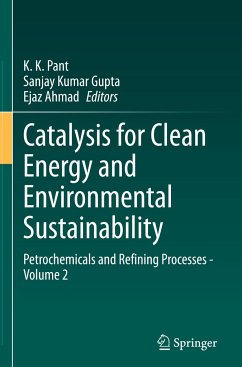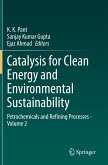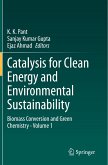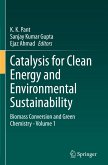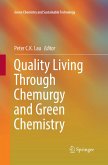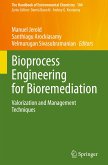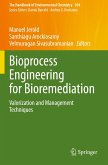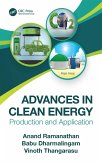Catalysis for Clean Energy and Environmental Sustainability
Petrochemicals and Refining Processes - Volume 2
Herausgegeben:Pant, K. K.; Gupta, Sanjay Kumar; Ahmad, Ejaz
Catalysis for Clean Energy and Environmental Sustainability
Petrochemicals and Refining Processes - Volume 2
Herausgegeben:Pant, K. K.; Gupta, Sanjay Kumar; Ahmad, Ejaz
- Gebundenes Buch
- Merkliste
- Auf die Merkliste
- Bewerten Bewerten
- Teilen
- Produkt teilen
- Produkterinnerung
- Produkterinnerung
This book is part of a two-volume work that offers a unique blend of information on realistic evaluations of catalyst-based synthesis processes using green chemistry principles and the environmental sustainability applications of such processes for biomass conversion, refining, and petrochemical production. The volumes provide a comprehensive resource of state-of-the-art technologies and green chemistry methodologies from researchers, academics, and chemical and manufacturing industrial scientists. The work will be of interest to professors, researchers, and practitioners in clean energy…mehr
Andere Kunden interessierten sich auch für
![Catalysis for Clean Energy and Environmental Sustainability Catalysis for Clean Energy and Environmental Sustainability]() Catalysis for Clean Energy and Environmental Sustainability149,79 €
Catalysis for Clean Energy and Environmental Sustainability149,79 €![Catalysis for Clean Energy and Environmental Sustainability Catalysis for Clean Energy and Environmental Sustainability]() Catalysis for Clean Energy and Environmental Sustainability104,99 €
Catalysis for Clean Energy and Environmental Sustainability104,99 €![Catalysis for Clean Energy and Environmental Sustainability Catalysis for Clean Energy and Environmental Sustainability]() Catalysis for Clean Energy and Environmental Sustainability112,99 €
Catalysis for Clean Energy and Environmental Sustainability112,99 €![Quality Living Through Chemurgy and Green Chemistry Quality Living Through Chemurgy and Green Chemistry]() Quality Living Through Chemurgy and Green Chemistry112,99 €
Quality Living Through Chemurgy and Green Chemistry112,99 €![Bioprocess Engineering for Bioremediation Bioprocess Engineering for Bioremediation]() Bioprocess Engineering for Bioremediation223,99 €
Bioprocess Engineering for Bioremediation223,99 €![Bioprocess Engineering for Bioremediation Bioprocess Engineering for Bioremediation]() Bioprocess Engineering for Bioremediation223,99 €
Bioprocess Engineering for Bioremediation223,99 €![Advances in Clean Energy Advances in Clean Energy]() Anand RamanathanAdvances in Clean Energy176,99 €
Anand RamanathanAdvances in Clean Energy176,99 €-
-
-
This book is part of a two-volume work that offers a unique blend of information on realistic evaluations of catalyst-based synthesis processes using green chemistry principles and the environmental sustainability applications of such processes for biomass conversion, refining, and petrochemical production. The volumes provide a comprehensive resource of state-of-the-art technologies and green chemistry methodologies from researchers, academics, and chemical and manufacturing industrial scientists. The work will be of interest to professors, researchers, and practitioners in clean energy catalysis, green chemistry, chemical engineering and manufacturing, and environmental sustainability.
This volume focuses on catalyst synthesis and green chemistry applications for petrochemical and refining processes. While most books on the subject focus on catalyst use for conventional crude, fuel-oriented refineries, this book emphasizes recent transitions to petrochemicalrefineries with the goal of evaluating how green chemistry applications can produce clean energy through petrochemical industrial means. The majority of the chapters are contributed by industrial researchers and technicians and address various petrochemical processes, including hydrotreating, hydrocracking, flue gas treatment and isomerization catalysts.
This volume focuses on catalyst synthesis and green chemistry applications for petrochemical and refining processes. While most books on the subject focus on catalyst use for conventional crude, fuel-oriented refineries, this book emphasizes recent transitions to petrochemicalrefineries with the goal of evaluating how green chemistry applications can produce clean energy through petrochemical industrial means. The majority of the chapters are contributed by industrial researchers and technicians and address various petrochemical processes, including hydrotreating, hydrocracking, flue gas treatment and isomerization catalysts.
Produktdetails
- Produktdetails
- Verlag: Springer / Springer International Publishing / Springer, Berlin
- Artikelnr. des Verlages: 978-3-030-65020-9
- 1st edition 2021
- Seitenzahl: 768
- Erscheinungstermin: 2. April 2021
- Englisch
- Abmessung: 241mm x 160mm x 44mm
- Gewicht: 1442g
- ISBN-13: 9783030650209
- ISBN-10: 3030650200
- Artikelnr.: 60465210
- Herstellerkennzeichnung Die Herstellerinformationen sind derzeit nicht verfügbar.
- Verlag: Springer / Springer International Publishing / Springer, Berlin
- Artikelnr. des Verlages: 978-3-030-65020-9
- 1st edition 2021
- Seitenzahl: 768
- Erscheinungstermin: 2. April 2021
- Englisch
- Abmessung: 241mm x 160mm x 44mm
- Gewicht: 1442g
- ISBN-13: 9783030650209
- ISBN-10: 3030650200
- Artikelnr.: 60465210
- Herstellerkennzeichnung Die Herstellerinformationen sind derzeit nicht verfügbar.
Prof. Kamal Kishore Pant is a Petrotech Chair Professor and Head of the Department of Chemical Engineering at IIT Delhi, and also Joint faculty CRDT, IIT Delhi, Adjunct Faculty at the University of Saskatchewan as well as Honorary Faculty at the University of Queensland, Australia. Prof. Pant's research contribution involves a wide range of innovative studies covering both theoretical and experimental aspects of heterogeneous catalysis for hydrocarbon conversion, CO2 capture and conversion, coal to chemical, bioenergy, waste to wealth, and value-added chemicals. Prof. Pant has 30 years of research and teaching experience during which he published 160+ Journal articles, book chapters, and patents, having more than 8000 citations and is granted several national and international patents. Most of Prof. Pant's research work is aligned with the internationally-focused research areas that include the development of coal to methanol process, CO 2 capture, and conversion, disposal of e-waste and precious metals recovery, waste plastic to liquid fuel technology, as well as biofuels production from residual agro biomass to thwart stubble burning. Prof. Pant is amongst the leading researchers in India working on solving the problems of accumulating electronic waste. Besides, Prof. Pant has extensively worked to develop novel catalysts for the direct conversion of Natural gas to pure hydrogen and Carbon nanotubes. Prof. Pant has also significantly contributed to developing novel catalysts for the dry reforming of methane and steam/oxidative steam reforming of Bioethanol and Bio-oil compounds, converting plastic waste and biomass to value-added chemicals which are highly appreciable in utilizing renewable sources in the country. Dr. Sanjay Kumar Gupta is the Technical Superintendent of Environmental Engineering in the Department of Civil Engineering at the Indian Institute of Technology, Delhi. Dr. Gupta started his research carrier in 1999 at CSIR-Indian Institute of Toxicology Research, Lucknow, India. His doctoral degree was awarded in 2010. Later, he did his post-doctoral research at Durban University, South Africa. He had been recognized three times as "One of the Top Publisher Post-Doc Fellow" in 2014, 2016, and 2017 for his active research contribution for his post-doctoral research. Dr. Gupta has co-edited three books published from Springer, Netherlands. His first book, "Algal Biofuels" is among one of the top downloaded books in the subject since 2017. Dr. Gupta has authored 81 articles in peer-reviewed journals and books, has presented 17 papers in the national and international conference. He was an Editor for the 'Journal of Ecophysiology and Occupational Health' and is a life member of many professional societies, including the International Society of Environmental Botanists, Society of Toxicology, Academy of Environmental Biology, and the Indian Network for Soil Contamination Research. His research interests include ecotoxicological risk assessment, bioremediation of water and wastewater, algal biotechnology, and biofuels. Dr. Ejaz Ahmad is an Assistant Professor in the Department of Chemical Engineering at the Indian Institute of Technology (ISM) Dhanbad. Dr. Ahmad completed his master's and doctoral thesis from the Department of Chemical Engineering, Indian Institute of Technology Delhi. He has also been a visiting research scholar to Fraunhofer UMSICHT, Germany, for a year as a recipient of the "German Academic Exchange Service (DAAD) Bi-national research grant." Moreover, he was awarded "Prime Minister Fellowship for Doctoral Research" for carrying out industrially relevant research. Dr. Ahmad has also been awarded the "Gandhian Young Technological Innovation Award (GYTI)" from the honorable President of India in 2018 on biofuels production and appreciated this year (2020) on E-waste conversion. He was also awarded the "FITT Award for BestIndustrially Relevant Thesis" by IIT Delhi for his work on "Understanding the Role of Catalyst Materials and Process Conditions in Biorenewable Transformations." Dr. Ahmad's research is focused on the development processes to produce alkyl levulinates as "Green Gasoline" from biorenewable resources, which are used as a fuel additive. The broad area of his research is based on the concept of "Waste to Wealth Technologies," which involves agro residue conversion, waste plastic, and e-waste conversion. His research has led to a detailed mechanistic insight into the bioprocessing of materials, experimentation, validation, and optimization of process parameters for providing optimum product yield. The conceptual insight was elaborated in a critical review published in the RSC journal "Green Chemistry," which was highlighted on its front cover. His two other papers have also been highlighted in "Green Chemistry" and the "ACS Sustainable Chemistry and Engineering" journal. As a recognition of his work, he has been given the membership of various national and international societies such as MRSC from Royal Society of Chemistry UK, Membership of Institution of Chemical Engineers, UK, Membership of Materials Research Society, USA, Membership of American Chemical Society and Life Membership of IIChE, India.
Chapter 1. Recent Advances in Hydrotreating/ Hydrodesulfurization Catalysts: Part I - Nature of Active Phase and Support.- Chapter 2. Recent Advances in Hydrotreating/ Hydrodesulfurization Catalysts: Part II - Catalyst Additives, Preparation Methods, Activation, Deactivation and Regeneration.- Chapter 3. Recent Developments in FCC process and Catalysts.- Chapter 4. Emerging Trends in Solid Acid Catalyst Alkylation Processes.- Chapter 5. Production of C3 based Petrochemicals: Recent Advances and Role of Catalyst.- Chapter 6. Selective Hydrogenation of 1, 3-Butadiene to 1-Butene: Review on Catalysts, Selectivity, Kinetics and Reaction Mechanism.- Chapter 7. Thermocatalytic conversion of Natural gas to petrochemical feedstocks via non oxidative methods: Theoretical and Experimental Approaches.- Chapter 8. Insights into Transition Metal Catalysed C-H Bond Activations.- Chapter 9. Flue gas treatment via dry reforming of methane.- Chapter 10.Catalysts deactivation challenges in refining and petrochemicals
industries.- Chapter 11. Non-Conventional Catalytic materials for Refining and Petrochemicals.- Chapter 12. Petcoke gasification: challenges and future prospects.- Chapter 13. Steam Reforming Catalyst for Membrane Refomer.- Chapter 14. Fischer-Tropsch Synthesis in Silicon and 3D Printed Stainless Steel Microchannel Microreactors.- Chapter 15. Recent advancement on catalyst development and kinetics for synthesis gas conversion into liquid fuel.- Chapter 16. Recent developments on clean fuels over SAPO type catalysts.- Chapter 17. Synthesis of Novel Catalysts for Carbon Dioxide Conversion to Products of Value.- Chapter 18. Perspectives in Carbon Oxides Conversion to Methanol/Dimethyl ether: Distinctive Contribution of Heterogeneous and Photocatalysis.- Chapter 19. Efficient homogeneous catalysts for conversion of CO2 to fine chemicals.- Chapter 20. Potential Application of Ionic Liquids and Deep Eutectic Solvents in Reduction of Industrial CO2 Emissions.- Chapter 21. Evolution of Ziegler Natta Catalysts for Polymerization of Olefins.- Chapter 22. Stability and Destabilization of Water-in-Crude Oil Emulsion.
industries.- Chapter 11. Non-Conventional Catalytic materials for Refining and Petrochemicals.- Chapter 12. Petcoke gasification: challenges and future prospects.- Chapter 13. Steam Reforming Catalyst for Membrane Refomer.- Chapter 14. Fischer-Tropsch Synthesis in Silicon and 3D Printed Stainless Steel Microchannel Microreactors.- Chapter 15. Recent advancement on catalyst development and kinetics for synthesis gas conversion into liquid fuel.- Chapter 16. Recent developments on clean fuels over SAPO type catalysts.- Chapter 17. Synthesis of Novel Catalysts for Carbon Dioxide Conversion to Products of Value.- Chapter 18. Perspectives in Carbon Oxides Conversion to Methanol/Dimethyl ether: Distinctive Contribution of Heterogeneous and Photocatalysis.- Chapter 19. Efficient homogeneous catalysts for conversion of CO2 to fine chemicals.- Chapter 20. Potential Application of Ionic Liquids and Deep Eutectic Solvents in Reduction of Industrial CO2 Emissions.- Chapter 21. Evolution of Ziegler Natta Catalysts for Polymerization of Olefins.- Chapter 22. Stability and Destabilization of Water-in-Crude Oil Emulsion.
Chapter 1. Recent Advances in Hydrotreating/ Hydrodesulfurization Catalysts: Part I - Nature of Active Phase and Support.- Chapter 2. Recent Advances in Hydrotreating/ Hydrodesulfurization Catalysts: Part II - Catalyst Additives, Preparation Methods, Activation, Deactivation and Regeneration.- Chapter 3. Recent Developments in FCC process and Catalysts.- Chapter 4. Emerging Trends in Solid Acid Catalyst Alkylation Processes.- Chapter 5. Production of C3 based Petrochemicals: Recent Advances and Role of Catalyst.- Chapter 6. Selective Hydrogenation of 1, 3-Butadiene to 1-Butene: Review on Catalysts, Selectivity, Kinetics and Reaction Mechanism.- Chapter 7. Thermocatalytic conversion of Natural gas to petrochemical feedstocks via non oxidative methods: Theoretical and Experimental Approaches.- Chapter 8. Insights into Transition Metal Catalysed C-H Bond Activations.- Chapter 9. Flue gas treatment via dry reforming of methane.- Chapter 10.Catalysts deactivation challenges in refining and petrochemicals
industries.- Chapter 11. Non-Conventional Catalytic materials for Refining and Petrochemicals.- Chapter 12. Petcoke gasification: challenges and future prospects.- Chapter 13. Steam Reforming Catalyst for Membrane Refomer.- Chapter 14. Fischer-Tropsch Synthesis in Silicon and 3D Printed Stainless Steel Microchannel Microreactors.- Chapter 15. Recent advancement on catalyst development and kinetics for synthesis gas conversion into liquid fuel.- Chapter 16. Recent developments on clean fuels over SAPO type catalysts.- Chapter 17. Synthesis of Novel Catalysts for Carbon Dioxide Conversion to Products of Value.- Chapter 18. Perspectives in Carbon Oxides Conversion to Methanol/Dimethyl ether: Distinctive Contribution of Heterogeneous and Photocatalysis.- Chapter 19. Efficient homogeneous catalysts for conversion of CO2 to fine chemicals.- Chapter 20. Potential Application of Ionic Liquids and Deep Eutectic Solvents in Reduction of Industrial CO2 Emissions.- Chapter 21. Evolution of Ziegler Natta Catalysts for Polymerization of Olefins.- Chapter 22. Stability and Destabilization of Water-in-Crude Oil Emulsion.
industries.- Chapter 11. Non-Conventional Catalytic materials for Refining and Petrochemicals.- Chapter 12. Petcoke gasification: challenges and future prospects.- Chapter 13. Steam Reforming Catalyst for Membrane Refomer.- Chapter 14. Fischer-Tropsch Synthesis in Silicon and 3D Printed Stainless Steel Microchannel Microreactors.- Chapter 15. Recent advancement on catalyst development and kinetics for synthesis gas conversion into liquid fuel.- Chapter 16. Recent developments on clean fuels over SAPO type catalysts.- Chapter 17. Synthesis of Novel Catalysts for Carbon Dioxide Conversion to Products of Value.- Chapter 18. Perspectives in Carbon Oxides Conversion to Methanol/Dimethyl ether: Distinctive Contribution of Heterogeneous and Photocatalysis.- Chapter 19. Efficient homogeneous catalysts for conversion of CO2 to fine chemicals.- Chapter 20. Potential Application of Ionic Liquids and Deep Eutectic Solvents in Reduction of Industrial CO2 Emissions.- Chapter 21. Evolution of Ziegler Natta Catalysts for Polymerization of Olefins.- Chapter 22. Stability and Destabilization of Water-in-Crude Oil Emulsion.

